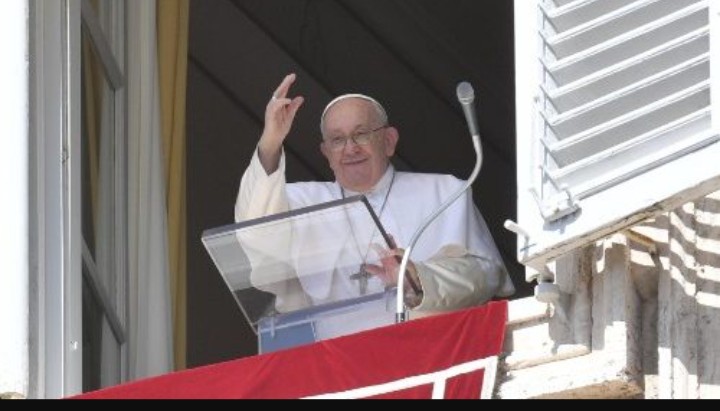
Pope Francis waiving to faithful during the Angelus
Agency report
Pope Francis reflects on the parable of the Workers in the Vineyard and emphasises that God’s love transcends human notions of justice and fairness and encourages all to experience His boundless mercy.
[the_ad id=”16914″]
Addressing the faithful gathered in St Peter’s Square for his Sunday Angelus on 24 September, Pope Francis centred his message on God’s boundless love, drawing inspiration from the parable of the workers in the vineyard.
The parable tells the story of a vineyard owner who hired labourers throughout the day, from early morning until late in the evening, yet paid them all the same wage. This apparent injustice served as a backdrop for Pope Francis’ exploration of God’s justice, which transcends earthly notions of fairness.
“It may seem like an injustice,” Pope Francis acknowledged, “but the parable should not be viewed through the lens of wages; rather, it is meant to reveal God’s criteria, where He does not calculate our merits but loves us as His children.”
Pope Francis highlighted two divine actions that emerge from the parable: God’s constant call and His equitable compensation.
[the_ad id=”16918″]
God’s constant call
“Firstly, God is the one who goes out at all hours to call us,” stressed the Pope. The parable illustrates how the vineyard owner went out repeatedly throughout the day to seek laborers. Pope Francis likened this to God’s tireless pursuit of humanity. “God does not wait for our efforts to reach out to us; He does not examine our merits before seeking us out,” Pope Francis said. “He does not give up if we delay in responding. Instead, He has taken the initiative, going out towards us in Jesus, to manifest His love. He seeks us at all hours of the day, representing the various phases and seasons of our lives, even into old age.”
Highlighting God’s boundless love and His unwavering commitment to humanity, Pope Francis stressed that, “For His heart, it is never too late; He searches for us and waits for us always.”
[the_ad id=”16917″]
God’s equitable compensation
Secondly, the Holy Father emphasised the parable’s ultimate message: God’s justice, which surpasses human understanding. “The last-hour workers are paid the same as the first because, in reality, God’s justice is higher,” he explained. Human justice dictates that we “give each one his due, according to their merits,” while God’s justice does not measure love on the scale of our achievements, performances, or failures. “God loves us simply because we are His children, with an unconditional and gratuitous love,” the Pope proclaimed.
Break free from the confines of calculative justice
In the midst of these reflections, Pope Francis issued a profound challenge to the faithful. He warned against adopting a “transactional” relationship with God, where we rely more on our own abilities than on the generosity of His grace. He also urged the Church not to see itself as superior but to extend its arms to all, remembering that God loves everyone with the same love He has for us. Furthermore, Pope Francis encouraged individuals to break free from the confines of calculative justice in their relationships and practice generosity, understanding, and forgiveness, just as Jesus teaches.
The Holy Father concluded his catechesis with a prayer, seeking the intercession of the Virgin Mary. “May the Madonna help us convert to God’s measure—a measure of boundless love.”
Source: Vaticannews







